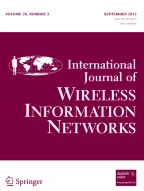Abstract
Next generation high capacity wireless networks need to support various types of traffic, including voice, video and data, each of which have different Quality of Service (QoS) requirements for successful transmission. This paper presents an advanced reservation packet access protocol BRTDMA (Block Reservation Time Division Multiple Access) that can accommodate voice and data traffic with equal efficiency in a wireless network. The proposed BRTDMA protocol has been designed to operate in a dynamic fashion by allocating resources according to the QoS criteria of voice and data traffic. Most of the existing reservation protocols offers reservation to voice traffic while data packets are transmitted using contention mode. In this paper we propose a block reservation technique to reserve transmission slots for data traffic for a short duration, which minimizes the speech packet loss and reduce the end-to-end delay for wireless data traffic. The optimum block reservation length for data traffic has been studied in a cellular mobile radio environment using a simulation model. Simulation results show that the BRTDMA protocol offers higher traffic capacity than standard PRMA protocol for integrated voice and data traffic and offers flexibility in accommodating multimedia traffic.
Similar content being viewed by others
REFERENCES
I. F. Akyildiz, et al., Medium Access Control Protocols for Multimedia Traffic in Wireless Network, IEEE Network Magazine, Vol. 13, No. 4, pp. 39–47, 1999.
P. Pirhonken, T. Rautava, and J. Penttinken, TDMA Convergence for Packet Data Services, IEEE Personal Communications, Vol. 6, No. 3, pp. 68–73, 1999.
Z. Zvonar, P. Jung and K. Kammerlander (Eds.), GSM Evolution Towards 3rd Generation Systems, Kluwer Academic Publishers, Boston, pp. 317–353, 1999.
D. J. Goodman, Cellular Packet Communication, IEEE Transactions on Communication, Vol. Comm-38, No., pp. 210–215, 1990.
G. Bianchi, et al., C-PRMA: A Centralized Packet Reservation Multiple Access for Local Wireless Communications, IEEE Transactions on Vehicular Technology, Vol. 46, No. 2, pp. 422–436, 1997.
A. Urie, M. Streeton, and C. Mourot, An Advanced TDMA Mobile Access System for UMTS, IEEE Personal Communications, Vol. 2, No. 2, pp. 36–45, 1995.
J. Dunlop, et al., A reservation based access mechanism for 3rd generation cellular systems, IEE Electronics & Communication Journal, Vol. 5, No. 3, pp. 180–186, 1993.
T. N. Saadawi, M. H. Ammar, and A. E. Hakeem, Fundamentals of Telecommunication Networks, John Wiley & Sons, Inc., pp. 235–252, 1994.
W. C. Y. Lee, Mobile Communications Engineering, McGraw Hill, pp. 149–157, 1998.
P. T. Brady, A Model for Generating On-Off Speech Patterns in Two Way Conversation, The Bell System Technical Journal, pp. 2445–2472, 1969.
J. Y. Khan, An Investigation into Variable Bit Rate Speech Coding for Packet Switched Digital Mobile Radio, Ph.D. Thesis, University of Strathclyde, UK, 1991.
Author information
Authors and Affiliations
Rights and permissions
About this article
Cite this article
Khan, J.Y., Li, Y. Block Reservation Time Division Multiple Access (BRTDMA) Protocol for a High Capacity Wireless Network. International Journal of Wireless Information Networks 7, 211–220 (2000). https://doi.org/10.1023/A:1009544223331
Issue Date:
DOI: https://doi.org/10.1023/A:1009544223331
